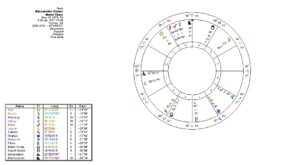Alexander Boxer’s A Scheme of Heaven is a new work about the history of astrology. Obviously published to capitalize on astrology’s current popularity, the book benefits from the author’s familiarity with ancient texts, but is ultimately undermined by his scientific point of view. 
Boxer is a classics scholar with an affection for the old tomes and languages. His bite-sized coverage of many astrological topics, from Manilius to Cardano, is often easy-to-understand and sometimes even entertaining. While the writer covers much familiar ground, I still learned some new things Chaucer wrote a textbook on using the astrolabe. Alexander the Great’s conquest in 331 BCE is accurately described by an eclipse omen tablet from 300 years before. And some have seen Shakespeare’s Hamlet as an astrological allegory, with the names Rosencrantz and Guildenstern turning up in Tycho Brahe’s family tree.
But the author is also a “data scientist.” The book’s U.S. subtitle, “The History of Astrology and the Search for Our Destiny in Data,” is, it seems to me, a faulty conceit. Boxer assumes that all astrology is essentially reducible to algorithms and statistics, and its allure simply due to our need for patterns. He rather gleefully and cavalierly reduces Bonatti’s rules for trading to a virtual investing program. In practice, it doesn’t work very well, but what could we expect without human judgment involved? (Mr. Boxer: Bonatti wrote aphorisms, NOT algorithms.)
Boxer addresses chart interpretation, the cyclic deaths of U.S. presidents in office and other topics in a similar manner, as the book devolves into a display of his cleverness. He’s solved the houses issue! He’s re-invented the chart wheel! (As his chart can’t even show an obvious opposition, it’s not of much use.) The writer couldn’t resist sharing his own birth data, with Jupiter rising in Leo square Venus and Mars in Taurus. The book’s major flaw is that it’s more about what the author can do than the topic at hand. His arrogance and self-indulgence have led him to presume that he could address a complex topic without being able to grasp its depth or the great continuity of its tradition. 
A Scheme of Heaven proves one thing: that astrology is an occult study (one concealed or not apparent to all). Despite reading Ptolemy, Vettius Valens and Guido Bonatti in their original languages, the writer nevertheless lacks an essential understanding of what astrology actually is. While real astrology is thriving and there’s a proliferation of online classes and certification today, Alexander Boxer still considers it “a topic for which the whole idea of expertise seems thoroughly up for grabs.” The reality is either obscured or he hasn’t even bothered to check. He considers Mercury to be “in retrograde,” a dead giveaway to astrological cluelessness.
With nearly 30 people thanked for their contributions to this offering from a major publisher, it’s baffling that not one real astrologer was consulted. And no editor, proofreader or fact-checker was able to rescue Boxer from the intellectual prison of his linear mind. Boxed-in, as it were.
It appears to have become acceptable to admit astrology’s prominence in the past but not the present. The closest the author gets to exploring contemporary astrology is having a cookbook print-out done for himself and family members. He gives short shrift to the last four hundred years, becoming more derivative and disillusioned with each century that lies beyond his expertise.
Alexander Boxer’s attitude towards astrology is ambiguous at best. He assures us he had a wonderful time researching and writing this book and that he’s not a true debunker. But he admits it’s politically incorrect to associate oneself too closely with astrology, and fears he may end up like Otto Neugebauer, who translated Babylonian astrological cuneiform texts and was supposedly labelled as something of a crank. Ironically, the writer will probably never again find another project as uniquely tailored to his own talents.
For those who want to know more about astrology’s past, A Scheme of Heaven is worth reading. It’s also indicative of the modern malaise of those with nothing to believe in, who summarily dismiss anything outside their limited view.
If you’d like to learn more about the history and spirit of astrology, try something like Anthony Aveni’s Conversing with the Planets (by a more simpatico non-believer). Or better yet, just read anything by an actual astrologer. They’re very easy to find these days. Unless, like Mr. Boxer, you choose not to look.
Check out A Scheme of Heaven on Amazon.com.
